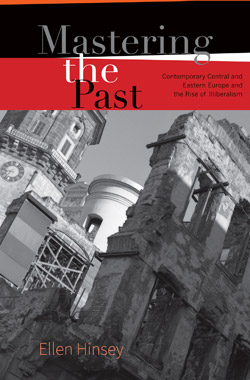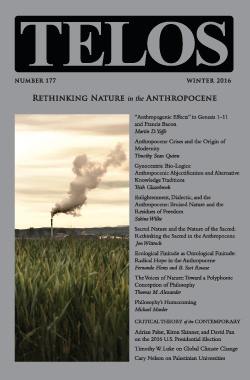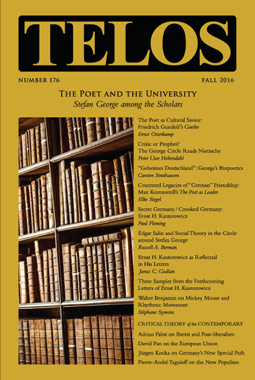By Telos Press · Monday, February 13, 2017 Mastering the Past:
Contemporary Central and Eastern Europe and the Rise of Illiberalism
by Ellen Hinsey
 Over the last decade Ellen Hinsey has traveled across Central and Eastern Europe researching a critical shift in the European political landscape: the rise of illiberalism. A quarter of a century after the changes of 1989—and as former Soviet sphere societies come to terms with their histories—the specters of populism, nationalism, extreme-right parties, and authoritarian rule have returned in force. Through a series of eyewitness reports, Mastering the Past offers an insider’s view of key political events, including the 2012 Russian elections, the Polish presidential plane crash in Smolensk, and Prime Minister Viktor Orbán’s vision for a new Hungary. Hinsey explores the darkening hour of European politics with an incisive mind and an eye for detail, recording the urgent danger that illiberalism represents for the new century. Over the last decade Ellen Hinsey has traveled across Central and Eastern Europe researching a critical shift in the European political landscape: the rise of illiberalism. A quarter of a century after the changes of 1989—and as former Soviet sphere societies come to terms with their histories—the specters of populism, nationalism, extreme-right parties, and authoritarian rule have returned in force. Through a series of eyewitness reports, Mastering the Past offers an insider’s view of key political events, including the 2012 Russian elections, the Polish presidential plane crash in Smolensk, and Prime Minister Viktor Orbán’s vision for a new Hungary. Hinsey explores the darkening hour of European politics with an incisive mind and an eye for detail, recording the urgent danger that illiberalism represents for the new century.
Continue reading →
By Russell A. Berman · Wednesday, December 21, 2016 In addition to its main focus on nature and the Anthropocene, Telos 177 (Winter 2016) features a special section of topical writing, introduced here by Russell A. Berman, that continues our ongoing commitment to setting forth a critical theory of the contemporary. Telos 177 is now available for purchase in our store.
 After a rancorous and ugly presidential campaign, in which vitriol and name-calling replaced discussion and policy, one moment stands out for its dignity: President Obama’s grace and generosity when he welcomed the president-elect to the White House. Above the fray and with a Lincolnian refusal of malice, he modeled a possibility of reconciliation and healing, as if citizens might genuinely respect each other, despite profound differences. That utopia will likely remain elusive, but the president’s bearing provides a lesson in civic virtue. Democracy can be coarse. He showed how it can be better. That legacy will be important. After a rancorous and ugly presidential campaign, in which vitriol and name-calling replaced discussion and policy, one moment stands out for its dignity: President Obama’s grace and generosity when he welcomed the president-elect to the White House. Above the fray and with a Lincolnian refusal of malice, he modeled a possibility of reconciliation and healing, as if citizens might genuinely respect each other, despite profound differences. That utopia will likely remain elusive, but the president’s bearing provides a lesson in civic virtue. Democracy can be coarse. He showed how it can be better. That legacy will be important.
Continue reading →
By Russell A. Berman · Wednesday, October 26, 2016 In addition to exploring the history and legacy of the George Circle, Telos 176 (Fall 2016) features a special section of topical writing, introduced here by Russell A. Berman, that continues our ongoing commitment to setting forth a critical theory of the contemporary. Telos 176 is now available for purchase in our store.
 For nearly half a century, Telos has sustained a discussion of critical theory, broadly understood, encompassing various and diverse intellectual traditions and individual thinkers whose work points toward trenchant examinations of our contemporary society and culture. Articles published in the journal operate in various registers—philosophy, political theory, intellectual history, cultural criticism, or more generically “theory”—but despite this range of disciplinary idioms, they each contribute directly or indirectly to the ongoing elaboration of an examination of the present. Beyond their import as contributions to their respective academic fields, Telos articles enhance our ability to articulate the ongoing and constantly evolving critical theory of the contemporary. For nearly half a century, Telos has sustained a discussion of critical theory, broadly understood, encompassing various and diverse intellectual traditions and individual thinkers whose work points toward trenchant examinations of our contemporary society and culture. Articles published in the journal operate in various registers—philosophy, political theory, intellectual history, cultural criticism, or more generically “theory”—but despite this range of disciplinary idioms, they each contribute directly or indirectly to the ongoing elaboration of an examination of the present. Beyond their import as contributions to their respective academic fields, Telos articles enhance our ability to articulate the ongoing and constantly evolving critical theory of the contemporary.
Continue reading →
 One often speaks of the importance of poetry for thought, even of poetry as a mode of thinking, and perhaps nowhere more than in Germany, the country of Dichter and Denker, of poets and thinkers. The German intellectual tradition is defined by a long, intimately interwoven relation between poetry and thought going back to the solidification of the Modern Age in the eighteenth century: Klopstock’s “Republic of Letters”; Goethe and Schiller’s Classicism, especially Schiller’s “aesthetic state”; Hölderlin’s “founding poets” and the centrality of poets in “the time of need”; Jena Romanticism’s inextricable relation between “Symphilosophie” and “Sympoesie”; Hegel’s definition of beauty as “the sensible shining forth of the idea”; and onward to this day. One often speaks of the importance of poetry for thought, even of poetry as a mode of thinking, and perhaps nowhere more than in Germany, the country of Dichter and Denker, of poets and thinkers. The German intellectual tradition is defined by a long, intimately interwoven relation between poetry and thought going back to the solidification of the Modern Age in the eighteenth century: Klopstock’s “Republic of Letters”; Goethe and Schiller’s Classicism, especially Schiller’s “aesthetic state”; Hölderlin’s “founding poets” and the centrality of poets in “the time of need”; Jena Romanticism’s inextricable relation between “Symphilosophie” and “Sympoesie”; Hegel’s definition of beauty as “the sensible shining forth of the idea”; and onward to this day.
Continue reading →
By Andreas Pantazopoulos · Thursday, August 11, 2016 How are we to explain the current “revolt against the elites,” the “new populist wave,” referred to by the French philosopher, political scientist, and historian of ideas Pierre-André Taguieff in a recent interview? What follows will try to reflect on specific aspects of the intimate relationship between populism and nationalism, the import of the conspiracist view of sociopolitical phenomena, and the overall “populist illusion” in the left-wing version of populism, with reference to the Greek experience of the past few years, notably through the Syriza phenomenon. To the extent possible, an effort will be made to examine this against the backdrop of a comparative approach to left-wing populism in general.
Continue reading →
Politicians who warn us against the New Right have been speaking about “Weimar conditions.” Isn’t the comparison with the pre-Hitler era exaggerated?
Not as far as the surprise attack dynamic is concerned. One is in fact reminded of the speed with which the National Socialist party gained political ground in the Weimar Republic. First it had 18%, then suddenly 30%, and soon governing without it became practically impossible. Let’s be honest: Today no one knows where the AfD will reach its limit. In Austria, the candidate of the right-wing populist FPÖ got half the votes. Not that long ago, who would have thought this possible?
Continue reading →
|
|
 Over the last decade Ellen Hinsey has traveled across Central and Eastern Europe researching a critical shift in the European political landscape: the rise of illiberalism. A quarter of a century after the changes of 1989—and as former Soviet sphere societies come to terms with their histories—the specters of populism, nationalism, extreme-right parties, and authoritarian rule have returned in force. Through a series of eyewitness reports, Mastering the Past offers an insider’s view of key political events, including the 2012 Russian elections, the Polish presidential plane crash in Smolensk, and Prime Minister Viktor Orbán’s vision for a new Hungary. Hinsey explores the darkening hour of European politics with an incisive mind and an eye for detail, recording the urgent danger that illiberalism represents for the new century.
Over the last decade Ellen Hinsey has traveled across Central and Eastern Europe researching a critical shift in the European political landscape: the rise of illiberalism. A quarter of a century after the changes of 1989—and as former Soviet sphere societies come to terms with their histories—the specters of populism, nationalism, extreme-right parties, and authoritarian rule have returned in force. Through a series of eyewitness reports, Mastering the Past offers an insider’s view of key political events, including the 2012 Russian elections, the Polish presidential plane crash in Smolensk, and Prime Minister Viktor Orbán’s vision for a new Hungary. Hinsey explores the darkening hour of European politics with an incisive mind and an eye for detail, recording the urgent danger that illiberalism represents for the new century. 



